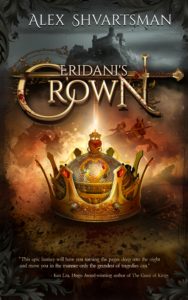 Eridani’s Crown (2019)
Eridani’s Crown (2019)
Written by: Alex Shvartsman
Genre: Epic Fantasy
Length: 265 pages
Publisher: UFO Publishing
Disclaimer: I received an Advanced Reader’s Copy for free in exchange for an honest review.
Why I Chose It: Politically intricate epic fantasy is one of my favorite speculative fiction sub-genres. True story: for our first holiday season together, I bought my now-husband the first three novels in George R.R. Martin’s A Song of Ice and Fire series, and we spent the next six months bickering with delight over them. I was also particularly intrigued by the promotional blurb (excerpted below), as it suggested that this novel might be one of those rare works that sets up its premises and then follows them to their logical conclusions, no matter how brutal that may turn out to be.
The Premise:
CURSED BY PROPHECY. CORRUPTED BY POWER.
When Eridani’s parents are murdered and their kingdom is seized by a traitorous duke, she plans to run. After she suffers yet another unendurable loss, the lure of revenge pulls her back.
Eridani’s brilliance as a strategist offers her a path to vengeance and the throne, but success may mean becoming everything she hates. To survive, she must sway religious zealots, outwit ambitious politicians, and confront bloodthirsty warlords, all with few allies and fewer resources. Yet the most menacing obstacle she must overcome is the prophecy uttered by a powerful sorceress:
Everyone you know and trust will come to betray you.
Minor Spoilers as to Tone of Ending Only, Because Nobody Should Spoil The Plot of A Politically Intricate Epic Fantasy. Please note that this review does contain minor spoilers of the same sort for the 2009 anime series Fullmetal Alchemist: Brotherhood and the 2006 psychological thriller film The Prestige.
Discussion: To talk about what this book does very well, I think it’s helpful to make a very short digression about how Fullmetal Alchemist: Brotherhood and The Prestige are thematically alike in one key respect. Fullmetal Alchemist: Brotherhood and The Prestige both deliver most of their emotional impact in the same manner. They set up worlds with premises and systems of all kinds (magical, political, and so forth) that operate according to particular rules, which they then follow all the way through to their logical conclusions, even when those conclusions are uncomfortable, horrifying, brutal, or deeply unhappy. What victory there is in these works has to be snatched out of the jaws of their own rule sets, and the snatching will make the protagonists bleed. No deus ex machina. No author cheating with secret exceptions that spare their darlings. Where I think The Prestige succeeds a little more fully in this sense is in the ending: The Prestige follows its premises all the way down, and to interpret its ending as remotely happy for anyone requires the viewer to add a lot of qualifiers as to what constitutes “happy.” Fullmetal Alchemist: Brotherhood gets 99.5% of the way there and then in the last ten minutes of the last episode quickly ties off some of its major plotlines off with happy bows that are tonally inconsistent with the rest of the series. It results in a unreservedly happy ending for most of the characters the viewers love, certainly, but not one that’s ultimately satisfying.
I love it when speculative works actually do what The Prestige does and follow their darkness all the way down. Eridani’s Crown does this. Here’s the only spoiler I will give you: it doesn’t have a happy ending. But it does have the right ending, one that left me contemplating whether Alexander the Great was lucky beyond measure in his death. I deeply appreciate that. Again, I don’t think nearly enough works dare to follow the weight of their own premises all the way to their logical ends.
My biggest hurdle in getting to that right ending was that I got there due to broad curiosity and not out of emotional investment. I never came to care what happened to Eridani, or any of the other members of the large cast of supporting characters, who felt largely interchangeable and who I could never entirely keep straight. This book is very tightly paced and plotted for an epic fantasy at 265 pages, which on one level I appreciate (one can only read so many 500+ page doorstoppers), but on another left me kind of wishing for the oft-standard 100+ pages of “Our Hero Growing Up, Look At Them Play With Kittens and Stuff!” material that kicks off so many works in the genre. It may have made Eridani more of a person and less of a piece on a board that we watch first get pushed around and then start doing the pushing. It’s interesting to watch the piece, but hard to flinch when it is handed a setback or cheer when it wrestles out a victory. I would have liked for it to have hurt that Eridani got the right, but not the happy, ending. Instead, I just found it intellectually satisfying.
In Conclusion: Eridani’s Crown is at its absolute best when it is sticking to the guns of its premise for the absolute worst, but flat characterization diminishes ones emotional investment in the outcomes. Overall, however, a sharp, fast read for the sorts of fans of brutal political epic fantasy who appreciate such outcomes being correct to the premise over ones that are “happy.”

No Comments